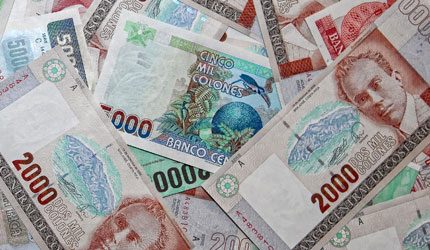
The president of Costa Rica’s Central Bank, Rodrigo Cubero, stated at a press conference this past Friday, that the country would record a drop in consumption for the first time in 38 years, and would suffer this 2020 the worst contraction of its economy since the crisis of the eighties.
The Bank presented the revision of its macroeconomic projections for the 2020-2021 biennium, which revealed a sharp drop in growth forecasts, as a result of the novel Coronavirus pandemic.
At the beginning of the year, the Bank estimated that the Costa Rican economy would grow 2.5%; however, it now predicts a -3.6% drop. This number is 0.3 percentage points higher than the World Bank estimate.
The president of the Central Bank described the situation by COVID-19 as “an unprecedented crisis”, which would hit sectors such as hotels and restaurants, entertainment, commerce, manufacturing and construction with greater force. Only the hotel sector would have a very hard fall of 27.6%. Likewise, he explained that the main component that would explain the fall is the drop in export levels, which would decrease to 5.3%.

“It is also expected, for the first time in 38 years, a drop in household consumption, which tends to be a very stable variable because families tend to protect their consumption with savings or debt, but the economic shock that is being faced this year it is of such magnitude that it is expected to fall and contribute negatively to economic growth by around 0.6% this year. “These decreasing pressures would only be partially offset by a drop in imports, although the magnitude of this factor fails to further mitigate the projected contraction”, Cubero said.
Cubero indicated that a slight rebound in 2021, of 2.3%, is also estimated, based on assumptions such as a lifting of sanitary measures that is carried out progressively by the second half of this year.
Tax figures
The Central Bank president did not provide projections on the country’s fiscal figures, whose financial deficit was estimated at 5.9% of GDP in mid-January, but should now fall further, as a result of an eventual drop in tax collection and higher expenses to cover social and health needs. In this regard, he said that the fiscal figures will be presented by the Finance Minister, Rodrigo Chaves, in the coming days. Chaves would give the estimates on the fiscal deficit; as well as the management of public debt and its accumulated, which was already expected above 60% of GDP without the arrival of the crisis.
Regarding other factors such as the exchange rate, the President of the Central Bank affirmed that no greater pressures have been faced so far, but that the institution he heads maintains the necessary reserves to avoid abrupt variations. Regarding the price of oil, he stated that relatively low prices are expected for the next two years, and that only in 2020 the country could stop paying $ 500 million for the oil bill.

